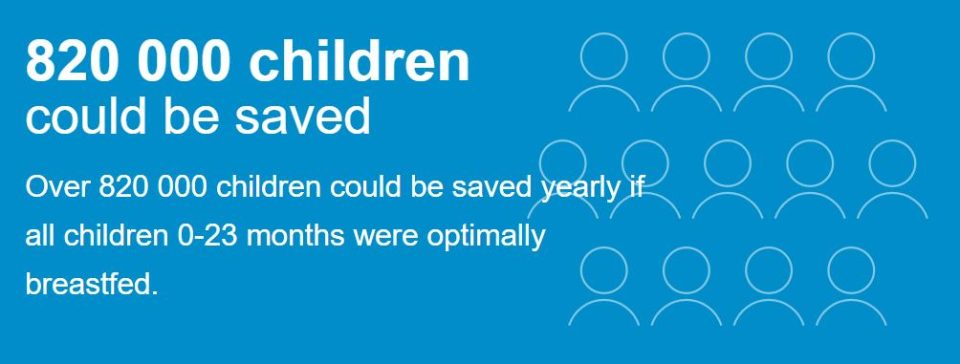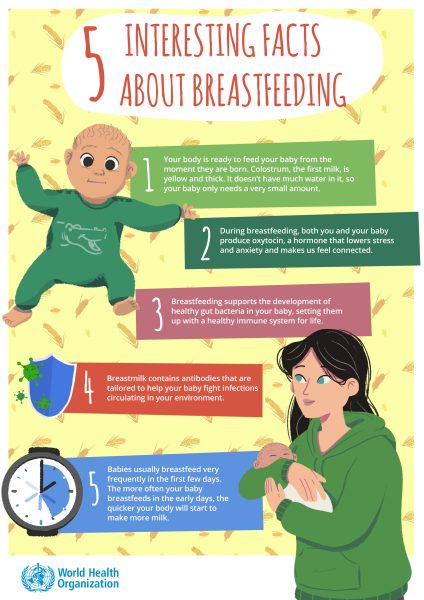
World Breastfeeding Week: How breastfeeding benefits both baby, mother

In the words of the World Health Organization (WHO), “if everyone steps up for breastfeeding, it will become much easier.”
World Breastfeeding Week is observed and celebrated from August 1 to August 7 every year. The day celebrates the act of breastfeeding as one of the most effective ways to ensure child health and survival.
The day is now commemorated in nearly 170 countries globally.
The week also celebrates the declaration signed in August 1990 by government policymakers, WHO, UNICEF and other organisations to protect, promote and support breastfeeding.

This year, the theme for the week is “Step up for breastfeeding: Educate and Support”. UNICEF and WHO are calling governments to allocate increased resources to protect, promote and support breastfeeding policies and programmes, especially for the most vulnerable families living in emergency settings.
As per experts, breastfeeding also acts like a baby’s first vaccine, protecting them from common childhood sickness.
Also read: 70.5 per cent Indians can’t afford a healthy diet, says a United Nation’s report
On the occasion of World Breastfeeding Week, in a joint statement, UNICEF Executive Director Catherine Russell and WHO Director-General Dr. Tedros Adhanom Ghebreyesus said, “As global crises continue to threaten the health and nutrition of millions of babies and children, the vital importance of breastfeeding as the best possible start in life is more critical than ever.”
“During emergencies, including those in Afghanistan, Ukraine, Yemen, the Horn of Africa, and the Sahel, breastfeeding guarantees a safe, nutritious and accessible food source for babies and young children. It offers a powerful line of defense against disease and all forms of child malnutrition, including wasting,” they added.
What is breastfeeding?
Breastfeeding is the act of feeding a baby breast milk of the mother, usually through direct skin-to-skin contact. It is often termed as nursing.
Breastmilk provides infants with the nutrients they need for healthy growth and development.
It provides antioxidants, enzymes and antibodies that boost the immune system of the child, also providing it long time immunity against various diseases.
Benefits for babies
Breastfeeding reduces the baby’s risk of suffering from obesity, asthma, cardiovascular diseases and Type 2 Diabetes.
It also promotes cognitive development in children.
Optimally breastfed children are less susceptible to chronic and infectious diseases.
Benefits for mothers
Breastfeeding also reduces mother’s risk of developing breast and ovarian cancer, cardiovascular disease, obesity and osteoporosis.
It reduces the risk of developing post-partum depression and boosts their self-confidence. It initiates the release of soothing hormones like oxytocin that reduces stress in mothers.

It also increases the emotional bondage between mother and child.
The more a mother breastfeeds, the greater are the benefits.
Global numbers
As per WHO, globally three in five children are not breastfed in the first hour of life.
The global health watchdog also observes that over 820,000 children can be saved yearly if all children between months zero to 23 were optimally breastfed.
Only 41% of infants aged between zero and six months of age are exclusively breastfed.
Globally in 2020, 149 million children under five were estimated to be stunted and 38.9 million were obese.
Ideal way
WHO and UNICEF recommend early initiation of breastfeeding within one hour of birth, exclusive breastfeeding for the first six months of life and introduction of complimentary foods with continued breastfeeding up to 2 years of age and beyond.

How can we make it easy?
WHO says the following steps can make breastfeeding much easier:
- When everyone steps up to support mothers
- When mothers start learning about it before the baby is born
- Ensuring the baby stays with the mother constantly in the days after birth
- Providing emotional and practical help to mothers
- Staying in touch with a trusted breastfeeding counsellor
- Ensuring a workplace provides support and dedicated time and space for mothers to breastfeed.


